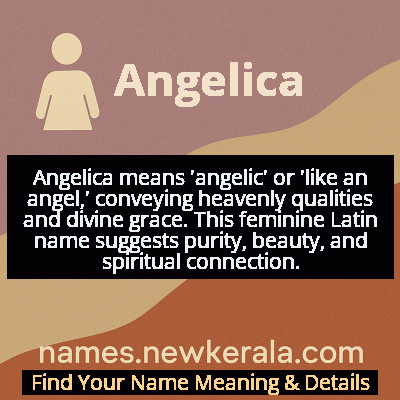Angelica Name Meaning & Details
Origin, Popularity, Numerology Analysis & Name Meaning of Angelica
Discover the origin, meaning, and cultural significance of the name ANGELICA. Delve into its historical roots and explore the lasting impact it has had on communities and traditions.
Name
Angelica
Gender
Female
Origin
Latin
Lucky Number
7
Meaning of the Name - Angelica
Angelica means 'angelic' or 'like an angel,' conveying heavenly qualities and divine grace. This feminine Latin name suggests purity, beauty, and spiritual connection.
Angelica - Complete Numerology Analysis
Your Numerology Number
Based on Pythagorean Numerology System
Ruling Planet
Neptune (Ketu)
Positive Nature
Intuitive, analytical, spiritual, and inquisitive.
Negative Traits
Secretive, reserved, aloof, and can be overly critical.
Lucky Colours
Green, yellow.
Lucky Days
Monday.
Lucky Stones
Cat’s eye, moonstone.
Harmony Numbers
1, 5, 6.
Best Suited Professions
Scientists, researchers, spiritual leaders, detectives.
What People Like About You
Depth of knowledge, analytical skills, spirituality.
Famous People Named Angelica
Angelica Kauffman
Painter
Neoclassical painter and founding member of the Royal Academy of Arts in London
Angelica Schuyler Church
Socialite
Prominent New York socialite and sister-in-law of Alexander Hamilton, immortalized in the musical Hamilton
Angelica Huston
Actress
Academy Award-winning actress known for roles in 'The Addams Family' and 'Prizzi's Honor'
Angelica Vale
Actress/Comedian
Mexican-American actress and comedian, winner of Latin Grammy for Best Children's Album
Name Variations & International Equivalents
Click on blue names to explore their detailed meanings. Gray names with will be available soon.
Cultural & Historical Significance
Extended Personality Analysis
Women named Angelica are often perceived as graceful, compassionate, and spiritually inclined individuals. The name's angelic connotations create expectations of kindness, empathy, and moral integrity. Many Angelicas develop strong intuitive abilities and a natural inclination toward helping others, often pursuing careers in caregiving, teaching, or artistic fields. They tend to carry themselves with elegance and poise, projecting an air of refinement that can sometimes be mistaken for aloofness. The literary heritage of the name also contributes to associations with intelligence, creativity, and strong willpower. Angelicas are frequently described as having artistic sensibilities and a deep appreciation for beauty in all its forms. While they may appear delicate, they often possess inner strength and resilience that surprises those who underestimate them. Their combination of gentleness and determination makes them effective leaders who can inspire others through both compassion and conviction. These personality associations, while not universally applicable, reflect the cultural expectations and symbolic weight that the name carries across different societies and historical periods.
Modern Usage & Popularity
Angelica remains a popular choice for baby girls in many Western countries, particularly in the United States, Latin America, and Southern Europe. In the US, the name peaked in popularity during the 1990s, likely influenced by the character Angelica Pickles from Rugrats, and has maintained steady usage since. The name enjoys particular favor among Hispanic communities, where it ranks consistently in the top 200 names. Modern parents are drawn to Angelica for its classic elegance, religious significance, and international appeal. While slightly less common than its variation Angelina, Angelica continues to be chosen by parents seeking a name that balances traditional values with contemporary sophistication. The name's versatility allows it to work well in both professional and personal contexts, contributing to its enduring appeal across generations. Recent trends show a slight decline in usage as parents explore more unique names, but Angelica maintains its position as a respected and recognizable choice that transcends fleeting naming fashions.
Symbolic & Spiritual Meanings
Symbolically, Angelica represents divine connection, purity, and spiritual guidance. The name evokes images of celestial beings acting as messengers between heaven and earth, suggesting someone who brings light, hope, and inspiration to others. In floral symbolism, angelica is also the name of a medicinal herb historically believed to have protective properties against evil spirits and illnesses, adding layers of healing and safeguarding to the name's meaning. Metaphorically, Angelica signifies someone who serves as a moral compass or brings comfort during difficult times. The name carries connotations of elevated consciousness, ethical clarity, and the ability to see beyond surface appearances to deeper truths. In many cultures, giving a child this name expresses the hope that they will develop qualities of compassion, wisdom, and the capacity to positively influence those around them. The symbolic resonance extends to concepts of guardianship, with Angelica representing both the protected and the protector—someone who both receives divine care and extends that care to others in their community.

